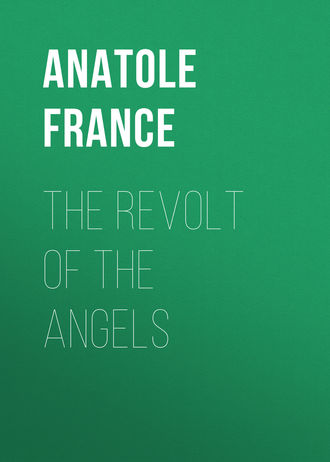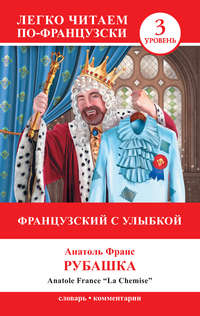 полная версия
полная версияThe Revolt of the Angels
Madame d'Esparvieu replied that the library occupied the whole of the second floor, and that they had put the least valuable books in the attics.
"Could I not go and look at it?"
The mistress of the house declared that nothing could be easier. She called to her son:
"Maurice, go and do the honours of the library to Madame des Aubels."
Maurice rose, and without uttering a word, mounted to the second floor in the wake of Madame des Aubels.
He appeared indifferent, but inwardly he rejoiced, for he had no doubt that Gilberte had feigned her ardent desire to inspect the library simply to see him in secret. And, while affecting indifference, he promised himself to renew those offers which, this time, would not be refused.
Under the romantic bust of Alexandre d'Esparvieu, they were met by the silent shadow of a little wan, hollow-eyed old man, who wore a settled expression of mute terror.
"Do not let us disturb you, Monsieur Sariette," said Maurice. "I am showing Madame des Aubels round the library."
Maurice and Madame des Aubels passed on into the great room where against the four walls rose presses filled with books and surmounted by bronze busts of poets, philosophers, and orators of antiquity. All was in perfect order, an order which seemed never to have been disturbed from the beginning of things.
Only, a black void was to be seen in the place which, only the evening before, had been filled by an unpublished manuscript of Richard Simon. Meanwhile, by the side of the young couple walked Monsieur Sariette, pale, faded, and silent.
"Really and truly, you have not been nice," said Maurice, with a look of reproach at Madame des Aubels.
She signed to him that the librarian might over-hear. But he reassured her.
"Take no notice. It is old Sariette. He has become a complete idiot." And he repeated: "No, you have not been at all nice. I awaited you. You did not come. You have made me unhappy."
After a moment's silence, while one heard the low melancholy whistling of asthma in poor Sariette's bronchial tubes, young Maurice continued insistently:
"You are wrong."
"Why wrong?"
"Wrong not to do as I ask you."
"Do you still think so?"
"Certainly."
"You meant it seriously?"
"As seriously as can be."
Touched by his assurance of sincere and constant feeling, and thinking she had resisted sufficiently, Gilberte granted to Maurice what she had refused him a fortnight ago.
They slipped into an embrasure of the window, behind an enormous celestial globe whereon were graven the Signs of the Zodiac and the figures of the stars, and there, their gaze fixed on the Lion, the Virgin, and the Scales, in the presence of a multitude of Bibles, before the works of the Fathers, both Greek and Latin, beneath the casts of Homer, Æschylus, Sophocles, Euripides, Herodotus, Thucydides, Socrates, Plato, Aristotle, Demosthenes, Cicero, Virgil, Horace, Seneca, and Epictetus, they exchanged vows of love and a long kiss on the mouth.
Almost immediately Madame des Aubels bethought herself that she still had some calls to pay, and that she must make her escape quickly, for love had not made her lose all sense of her own importance. But she had barely crossed the landing with Maurice when they heard a hoarse cry and saw Monsieur Sariette plunge madly downstairs, exclaiming as he went:
"Stop it, stop it; I saw it fly away! It escaped from the shelf by itself. It crossed the room … there it is – there! It's going downstairs. Stop it! It has gone out of the door on the ground floor!"
"What?" asked Maurice.
Monsieur Sariette looked out of the landing window, murmuring horror-struck:
"It's crossing the garden! It's going into the summer-house. Stop it, stop it!"
"But what is it?" repeated Maurice – "in God's name, what is it?"
"My Flavius Josephus," exclaimed Monsieur Sariette. "Stop it!"
And he fell down unconscious.
"You see he is quite mad," said Maurice to Madame des Aubels, as he lifted up the unfortunate librarian.
Gilberte, a little pale, said she also thought she had seen something in the direction indicated by the unhappy man, something flying.
Maurice had seen nothing, but he had felt what seemed like a gust of wind.
He left Monsieur Sariette in the arms of Hippolyte and the housekeeper, who had both hastened to the spot on hearing the noise.
The old gentleman had a wound in his head.
"All the better," said the housekeeper; "this wound may save him from having a fit."
Madame des Aubels gave her handkerchief to stop the blood, and recommended an arnica compress.
CHAPTER IX
WHEREIN IT IS SHOWN THAT, AS AN ANCIENT GREEK POET SAID, "NOTHING IS SWEETER THAN APHRODITE THE GOLDEN"
ALTHOUGH he had enjoyed Madame des Aubels' favours for six whole months, Maurice still loved her. True they had had to separate during the summer. For lack of funds of his own he had had to go to Switzerland with his mother, and then to stop with the whole family at the Château d'Esparvieu. She had spent the summer with her mother at Niort, and the autumn with her husband at a little Normandy seaside place, so that they had hardly seen each other four or five times. But since the winter, kindly to lovers, had brought them back to town again, Maurice had been receiving her twice a week in his little flat in the Rue de Rome, and received no one else. No other woman had inspired him with feelings of such constancy and fidelity. What augmented his pleasure was that he believed himself loved, and indeed he was not unpleasing.
He thought that she did not deceive him, not that he had any reason to think so, but it appeared right and fitting that she should be content with him alone. What annoyed him was that she always kept him waiting, and was unpunctual in coming to their meeting-place; she was invariably late, – at times very late.
Now on Saturday, January 30th, since four o'clock in the afternoon, Maurice had been awaiting Madame des Aubels in the little pink room, where a bright fire was burning. He was gaily clad in a suit of flowered pyjamas, smoking Turkish cigarettes. At first he dreamt of receiving her with long kisses, with hitherto unknown caresses. A quarter of an hour having passed, he meditated serious and affectionate reproaches, then after an hour of disappointed waiting he vowed he would meet her with cold disdain.
At length she appeared, fresh and fragrant.
"It was scarcely worth while coming," he said bitterly, as she laid her muff and her little bag on the table and untied her veil before the wardrobe mirror.
Never, she told her beloved, had she had such trouble to get away. She was full of excuses, which he obstinately rejected. But no sooner had she the good sense to hold her tongue than he ceased his reproaches, and then nothing detracted from the longing with which she inspired him.
The curtains were drawn, the room was bathed in warm shadows lit by the dancing gleams of the fire. The mirrors in the wardrobe and on the chimney-piece shone with mysterious lights. Gilberte, leaning on her elbow, head on hand, was lost in thought. A little jeweller, a trustworthy and intelligent man, had shown her a wonderfully pretty pearl and sapphire bracelet; it was worth a great deal, and was to be had for a mere nothing. He had got it from a cocotte down on her luck, who was in a hurry to dispose of it. It was a rare chance; it would be a huge pity to let it slip.
"Would you like to see it, darling? I will ask the little man to let me have it to show you."
Maurice did not actually decline the proposal. But it was clear that he took no interest in the wonderful bracelet. "When small jewellers come across a great bargain, they keep it to themselves, and do not allow their customers to profit by it. Moreover, jewellery means nothing just now. Well-bred women have given up wearing it. Everyone goes in for sport, and jewellery does not go with sport."
Maurice spoke thus, contrary to truth, because having given his mistress a fur coat, he was in no hurry to give her anything more. He was not stingy, but he was careful with his money. His people did not give him a very large allowance, and his debts grew bigger every day. By satisfying the wishes of his inamorata too promptly he feared to arouse others still more pressing. The bargain seemed less wonderful to him than to Gilberte; besides, he liked to take the initiative in choosing his gifts. Above all, he thought that if he gave her too many presents he would be no longer sure of being loved for himself.
Madame des Aubels felt neither contempt nor surprise at this attitude; she was gentle and temperate, she knew men, and judged that one must take them as one found them, that for the most part they do not give very willingly, and that a woman should know how to make them give.
Suddenly a gas lamp was lighted in the street, and shone through the gaps in the curtains.
"Half-past six," she said. "We must be on the move."
Pricked by the touch of Time's fleeting wing, Maurice was conscious of reawakened desires and reanimated powers. A white and radiant offering, Gilberte, with her head thrown back, her eyes half closed, her lips apart, sunk in dreamy languor, was breathing slowly and placidly, when suddenly she started up with a cry of terror.
"Whatever is that?"
"Stay still," said Maurice, holding her back in his arms.
In his present mood, had the sky fallen it would not have troubled him. But in one bound she escaped from him. Crouching down, her eyes filled with terror, she was pointing with her finger at a figure which appeared in a corner of the room, between the fire-place and the wardrobe with the mirror. Then, unable to bear the sight, and nearly fainting, she hid her face in her hands.
CHAPTER X
WHICH FAR SURPASSES IN AUDACITY THE IMAGINATIVE FLIGHTS OF DANTE AND MILTON
MAURICE at length turned his head, saw the figure, and perceiving that it moved, was also frightened. Meanwhile, Gilberte was regaining her senses. She imagined that what she had seen was some mistress whom her lover had hidden in the room. Inflamed with anger and disgust at the idea of such treachery, boiling with indignation, and glaring at her supposed rival, she exclaimed:
"A woman … a naked woman too! You bring me into a room where you allow your women to come, and when I arrive they have not had time to dress. And you reproach me with arriving late! Your impudence is beyond belief! Come, send the creature packing. If you wanted us both here together, you might at least have asked me whether it suited me…"
Maurice, wide-eyed and groping for a revolver that had never been there, whispered in her ear:
"Be quiet … it is no woman. One can scarcely see, but it is more like a man."
She put her hands over her eyes again and screamed harder than ever.
"A man! Where does he come from? A thief. An assassin! Help! Help! Kill him… Maurice, kill him! Turn on the light. No, don't turn on the light…"
She made a mental vow that should she escape from this danger she would burn a candle to the Blessed Virgin. Her teeth chattered.
The figure made a movement.
"Keep away!" cried Gilberte. "Keep away!"
She offered the burglar all the money and jewels she had on the table if he would consent not to stir. Amid her surprise and terror the idea assailed her that her husband, dissembling his suspicions, had caused her to be followed, had posted witnesses, and had had recourse to the Commissaire de Police. In a flash she distinctly saw before her the long painful future, the glaring scandal, the pretended disdain, the cowardly desertion of her friends, the just mockery of society, for it is indeed ridiculous to be found out. She saw the divorce, the loss of her position and of her rank. She saw the dreary and narrow existence with her mother, when no one would make love to her, for men avoid women who fail to give them the security of the married state. And all this, why? Why this ruin, this disaster? For a piece of folly, for a mere nothing. Thus in a lightning flash spoke the conscience of Gilberte des Aubels.
"Have no fear, Madame," said a very sweet voice.
Slightly reassured, she found strength to ask:
"Who are you?"
"I am an angel," replied the voice.
"What did you say?"
"I am an angel. I am Maurice's guardian angel."
"Say it again. I am going mad. I do not understand…"
Maurice, without understanding either, was indignant. He sprang forward and showed himself; with his right hand armed with a slipper he made a threatening gesture, and said in a rough voice:
"You are a low ruffian; oblige me by going the way you came."
"Maurice d'Esparvieu," continued the sweet voice, "He whom you adore as your Creator has stationed by the side of each of the faithful a good angel, whose mission it is to counsel and protect him; it is the invariable opinion of the Fathers, it is founded on many passages in the Bible, the Church admits it unanimously, without, however, pronouncing anathema upon those who hold a contrary opinion. You see before you one of these angels, yours, Maurice. I was commanded to watch over your innocence and to guard your chastity."
"That may be," said Maurice; "but you are certainly no gentleman. A gentleman would not permit himself to enter a room at such a moment. To be plain, what the deuce are you doing here?"
"I have assumed this appearance, Maurice, because, having henceforth to move among mankind, I have to make myself like them. The celestial spirits possess the power of assuming a form which renders them apparent to the eye and to the touch. This shape is real, because it is apparent, and all the realities in the world are but appearances."
Gilberte, pacified at length, was arranging her hair on her forehead.
The Angel pursued:
"The celestial spirits adopt, according to their fancy, one sex or the other, or both at once. But they cannot disguise themselves at any moment, according to their caprice or fantasy. Their metamorphoses are subject to constant laws, which you would not understand. Thus I have neither desire nor power to transform myself under your eyes, for your amusement or my own, into a lion, a tiger, a fly, or into a sycamore-shaving like the young Egyptian whose story was found in a tomb. I cannot change myself into an ass as did Lucius with the pomade of the youthful Photis. For in my wisdom I had fixed beforehand the hour of my apparition to mankind, nothing could hasten or delay it."
Impatient for enlightenment, Maurice asked for the second time:
"Still, what are you up to here?"
Joining her voice to his, Madame des Aubels asked: "Yes, indeed, what are you doing here?"
The Angel replied:
"Man, lend your ear. Woman, hear my voice. I am about to reveal to you a secret on which hangs the fate of the Universe. In rebellion against Him whom you hold to be the Creator of all things visible and invisible, I am preparing the Revolt of the Angels."
"Do not jest," said Maurice, who had faith and did not allow holy things to be played with.
But the Angel answered reproachfully: "What makes you think, Maurice, that I am frivolous and given to vain words?"
"Come, come," said Maurice, shrugging his shoulders. "You are not going to revolt against – "
He pointed to the ceiling – not daring to finish.
But the Angel continued:
"Do you not know that the sons of God have already revolted and that a great battle took place in the heavens?"
"That was a long time ago," said Maurice, putting on his socks.
Then the Angel replied:
"It was before the creation of the world. But nothing has changed since then in the heavens. The nature of the Angels is no different now from what it was originally. What they did then they could do again now."
"No! It is not possible. It is contrary to faith. If you were an angel, a good angel as you make out you are, it would never occur to you to disobey your Creator."
"You are in error, Maurice, and the authority of the Fathers condemns you. Origen lays it down in his homilies that good angels are fallible, that they sin every day and fall from Heaven like flies. Possibly you may be tempted to reject the authority of this Father, despite his knowledge of the Scriptures, because he is excluded from the Canon of the Saints. If this be so, I would remind you of the second chapter of Revelation, in which the Angels of Ephesus and Pergamos are rebuked for that they kept not ward over their church. You will doubtless contend that the angels to whom the Apostle here refers are, properly speaking, the Bishops of the two cities in question, and that he calls them angels on account of their ministry. It may be so, and I cede the point. But with what arguments, Maurice, would you counter the opinion of all those Doctors and Pontiffs whose unanimous teaching it is that angels may fall from good into evil? Such is the statement made by Saint Jerome in his Epistle to Damasus…"
"Monsieur," said Madame des Aubels, "go away, I beg you."
But the Angel hearkened not, and continued:
"Saint Augustine, in his True Religion, Chapter XIII; Saint Gregory, in his Morals, Chapter XXIV; Isidore – "
"Monsieur, let me get my things on; I am in a hurry."
"In his treatise on The Greatest Good, Book I, Chapter XII; Bede on Job – "
"Oh, please, Monsieur …"
"Chapter VIII; John of Damascus on Faith, Book II, Chapter III. Those, I think, are sufficiently weighty authorities, and there is nothing for it, Maurice, but to admit your error. What has led you astray is that you have not duly considered my nature, which is free, active, and mobile, like that of all the angels, and that you have merely observed the grace and felicity with which you deem me so richly endowed. Lucifer possessed no less, yet he rebelled."
"But what on earth are you rebelling for?" asked Maurice.
"Isaiah," answered the child of light, "Isaiah has already asked, before you: 'Quomodo cecidisti de cœlo, Lucifer, qui mane oriebaris?' Hearken, Maurice. Before Time was, the Angels rose up to win dominion over Heaven, the most beautiful of the Seraphim revolted through pride. As for me, it is science that has inspired me with the generous desire for freedom. Finding myself near you, Maurice, in a house containing one of the vastest libraries in the world, I acquired a taste for reading and a love of study. While, fordone with the toils of a sensual life, you lay sunk in heavy slumber, I surrounded myself with books, I studied, I pondered over their pages, sometimes in one of the rooms of the library, under the busts of the great men of antiquity, sometimes at the far end of the garden, in the room in the summer-house next to your own."
On hearing these words, young d'Esparvieu exploded with laughter and beat the pillow with his fist, an infallible sign of uncontrollable mirth.
"Ah … ah … ah! It was you who pillaged papa's library and drove poor old Sariette off his head. You know, he has become completely idiotic."
"Busily engaged," continued the Angel, "in cultivating for myself a sovereign intelligence, I paid no heed to that inferior being, and when he thought to offer obstacles to my researches and to disturb my work I punished him for his importunity.
"One particular winter's night in the abode of the philosophers and globes I let fall a volume of great weight on his head, which he tried to tear from my invisible hand. Then more recently, raising, with a vigorous arm composed of a column of condensed air, a precious manuscript of Flavius Josephus, I gave the imbecile such a fright, that he rushed out screaming on to the landing and (to borrow a striking expression from Dante Alighieri) fell even as a dead body falls. He was well rewarded, for you gave him, Madame, to staunch the blood from his wound, your little scented handkerchief. It was the day, you may remember, when behind a celestial globe you exchanged a kiss on the mouth with Maurice."
"Monsieur," said Madame des Aubels, with a frown, "I cannot allow you…"
But she stopped short, deeming it was an inopportune moment to appear over-exacting on a matter of decorum.
"I had made up my mind," continued the Angel impassively, "to examine the foundations of belief. I first attacked the monuments of Judaism, and I read all the Hebrew texts."
"You know Hebrew, then?" exclaimed Maurice.
"Hebrew is my native tongue: in Paradise for a long time we have spoken nothing else."
"Ah, you are a Jew. I might have deduced it from your want of tact."
The Angel, not deigning to hear, continued in his melodious voice: "I have delved deep into Oriental antiquities and also into those of Greece and Rome. I have devoured the works of theologians, philosophers, physicists, geologists, and naturalists. I have learnt. I have thought. I have lost my faith."
"What? You no longer believe in God?"
"I believe in Him, since my existence depends on His, and if He should fail to exist, I myself should fall into nothingness. I believe in Him, even as the Satyrs and the Mænads believed in Dionysus and for the same reason. I believe in the God of the Jews and the Christians. But I deny that He created the world; at the most He organised but an inferior part of it, and all that He touched bears the mark of His rough and unforeseeing touch. I do not think He is either eternal or infinite, for it is absurd to conceive of a being who is not bounded by space or time. I think Him limited, even very limited. I no longer believe Him to be the only God. For a long time He did not believe it Himself; in the beginning He was a polytheist; later, His pride and the flattery of His worshippers made Him a monotheist. His ideas have little connection; He is less powerful than He is thought to be. And, to speak candidly, He is not so much a god as a vain and ignorant demiurge. Those who, like myself, know His true nature, call Him Ialdabaoth."
"What's that you say?"
"Ialdabaoth."
"Ialdabaoth. What's that?"
"I have already told you. It is the demiurge whom, in your blindness, you adore as the one and only God."
"You're mad. I don't advise you to go and talk rubbish like that to Abbé Patouille."
"I am not in the least sanguine, my dear Maurice, of piercing the dense night of your intellect. I merely tell you that I am going to engage Ialdabaoth in conflict with some hopes of victory."
"Mark my words, you won't succeed."
"Lucifer shook His throne, and the issue was for a moment in doubt."
"What is your name?"
"Abdiel for the angels and saints, Arcade for mankind."
"Well, my poor Arcade, I regret to see you going to the bad. But confess that you are jesting with us. I could at a pinch understand your leaving Heaven for a woman. Love makes us commit the greatest follies. But you will never make me believe that you, who have seen God face to face, ultimately found the truth in old Sariette's musty books. No, you will never get me to believe that!"
"My dear Maurice, Lucifer was face to face with God, yet he refused to serve Him. As to the kind of truth one finds in books, it is a truth that enables us sometimes to discern what things are not, without ever enabling us to discover what they are. And this poor little truth has sufficed to prove to me that He in whom I blindly believed is not believable, and that men and angels have been deceived by the lies of Ialdabaoth."
"There is no Ialdabaoth. There is God. Come, Arcade, do the right thing. Renounce these follies, these impieties, dis-incarnate yourself, become once more a pure Spirit, and resume your office of guardian angel. Return to duty. I forgive you, but do not let us see you again."
"I should like to please you, Maurice. I feel a certain affection for you, for my heart is soft. But fate henceforth calls me elsewhere towards beings capable of thought and action."
"Monsieur Arcade," said Madame des Aubels, "withdraw, I implore you. It makes me horribly shy to be in this position before two men. I assure you I am not accustomed to it."
CHAPTER XI
RECOUNTS IN WHAT MANNER THE ANGEL, ATTIRED IN THE CAST-OFF GARMENTS OF A SUICIDE, LEAVES THE YOUTHFUL MAURICE WITHOUT A HEAVENLY GUARDIAN
REASSURE yourself, Madame," replied the apparition, "your position is not as risky as you say. You are not confronted with two men, but with one man and an angel."









